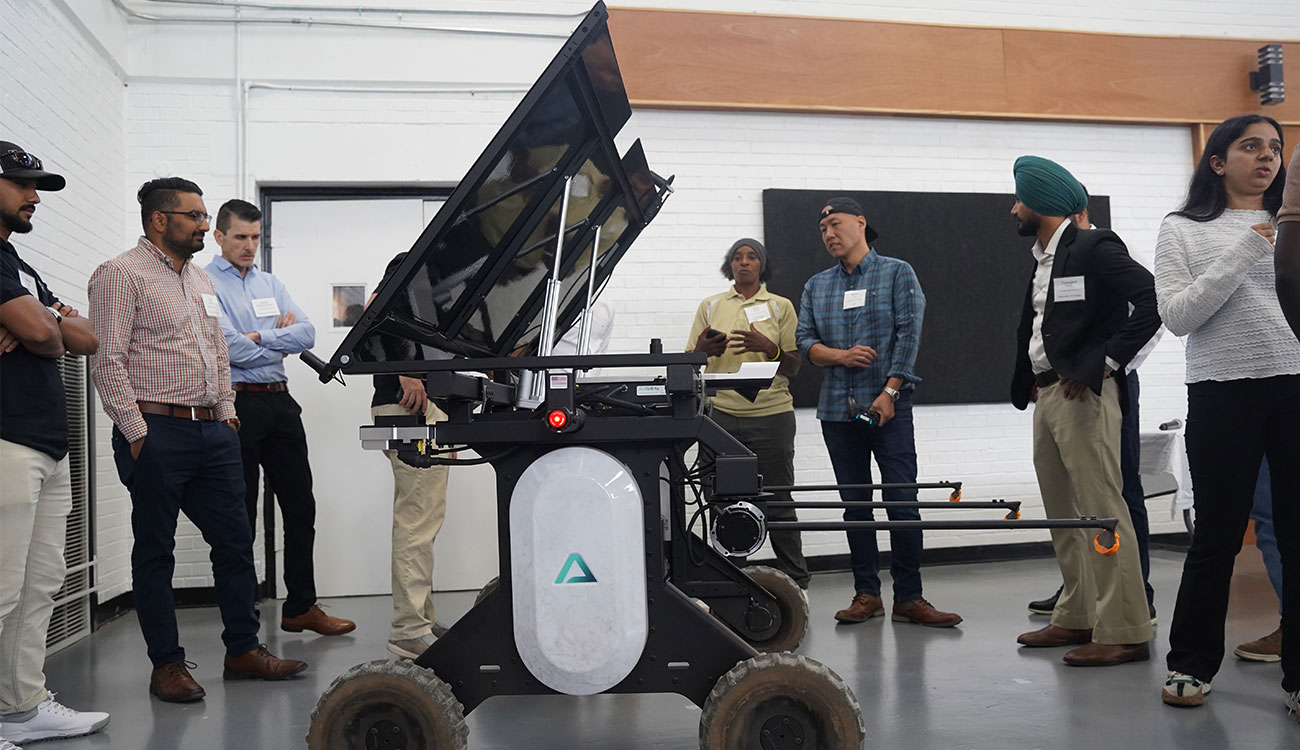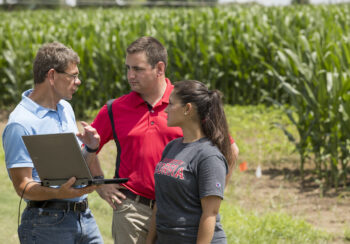It’s a Thursday morning in the Perry (Ga.) Events Center, a high-ceilinged, white-walled open room that used to serve as an armory. It’s filled with just shy of 150 attendees of the 2nd Integrative Precision Agriculture Conference hosted by the University of Georgia’s Institute for Integrative Precision Agriculture(IIPA).
When the first conference was held two years ago, the goal was to bring together industry leaders, policy makers, and agriculture experts to identify and propose solutions for pressing challenges facing farmers around the globe. This year, says IIPA director and conference organizer George Vellidis, is about seeing some of those solutions in action, one of which is on display at the front of the room.
Researchers, students, industry leaders, and government representatives watch closely as what appears to be a midsized desk on
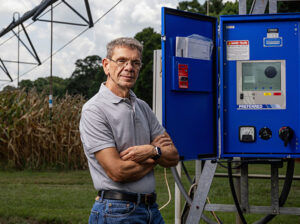
wheels rolls across the floor, occasionally waving two thin steel arms in front of itself. It looks like a drafting table for artists and designers but instead is a cutting-edge field robot that reduces the reliance on chemicals and could improve crop yields.
It’s the Aigen Element, a fully autonomous robot that eliminates herbicide-resistant weeds with precise ground strikes. The “desk” is a solar panel that powers the machine during its hours in the field, and the arms in front serve as weeding forks. Using computer vision, the machine can roll along rows of crops and identify weeds, signaling the arms to strike the ground and remove the unwanted plants.
Aigen is one of eight companies that spoke about their innovations at the conference, which was held in Perry to commemorate the groundbreaking of the nearby UGA Grand Farm, a working farm innovation hub that is deploying its first field projects this year. An initiative that first launched in North Dakota in 2019 under the watch of then-Secretary of Agriculture Sonny Perdue (now University System of Georgia chancellor), this new location is led by UGA’s College of Agricultural and Environmental Sciences (CAES) and has 10 inaugural partner companies from four different countries.
The IPA Conference was a perfect opportunity to shine a spotlight on those new partners.
“These partnerships are a way to accelerate the transition of knowledge we create at UGA—that fundamental research—into companies that produce products and services that allow the agriculture industry to move forward,” Vellidis said.
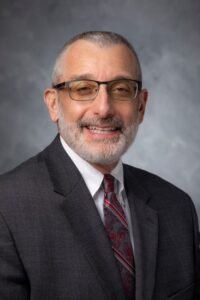
The conference featured speakers from across the Georgia innovation ecosystem. UGA interim Vice President for Research Chris King discussed the university’s investments into precision agriculture faculty and resources, as well as the integral role it plays on the state’s largest industry. IIPA bring in faculty from a variety of units across campus: Franklin College of Arts and Sciences, Warnell School of Forestry and Natural Resources, School of Computing, College of Engineering, CAES, and more.
Vellidis discussed the academic pipeline at UGA—the students—who he sees as the foundation that will make Georgia the “AgTech Silicon Valley of the (United States).” At the conference were more than 50 students who participated in a poster competition (Madelyn Willis won first place in the master’s competition and Priyanka Dahiya the Ph.D.).
Georgia Research Alliance President and CEO Tim Denning highlighted the importance of his organization’s investments in good ideas and talented researchers. In Georgia alone, there are 10 million acres of farmland and 400,000 people employed in agribusiness amounting to a $75 billion economic impact on the state.
State Senator Larry Walker shared the parties that helped make something like the Grand Farm possible and why such a place was vital to the state of Georgia.
“It’s critical that we have things like this to bring together all these people—researchers, industry, producers, government leaders—to have networking opportunities and to learn,” said Nick Place, dean of CAES. “Industry must learn from producers what they need, as do researchers. Conferences like this are where we can talk about those things and identify solutions to some of our grandest challenges.”
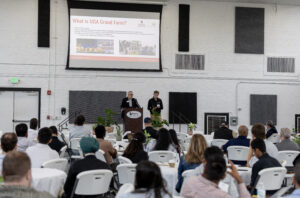
On this Thursday, it was the Grand Farm partners who got top billing.
In addition to Aigen, there was iCrop, an intelligent data platform that helps agriculture companies optimize business processes; Sentinel, which provides novel nitrogen management capabilities; and Sabanto, an autonomous tractor provider, among others.
The full list of inaugural partners also includes AquaSpy, earnest, Setatech, CroBio, efpolymer, Sentera, Sentinel X, the Georgia Center of Innovation, and AgGeorgia Farm Credit.
“Some of the things we identified at that first IPA Conference were automation to alleviate the cost and shortage of farm labor,” Vellidis said. “Also, things that could improve yields, efficiency, and environmental impact of the farms.”
Grand Farm Ecosystems Director Andrew Jason spoke on why Georgia was a perfect place to address these challenges.
“I think there’s a couple of things you need to do to create these thriving regional ecosystems: You need passionate and innovative growers; you need world-class research and extension; you need government, state, and local officials all bought in on a vision,” Jason said. “The University of Georgia and the state have all these things and more.
“There’s a huge opportunity to build on that, but we have to make sure these companies can take what we do at the farm and spread solutions across the southeast.”
“That’s our obligation as a land-grant university,” Place said. “To do research that is cutting edge and meeting the needs of our stakeholders.”



